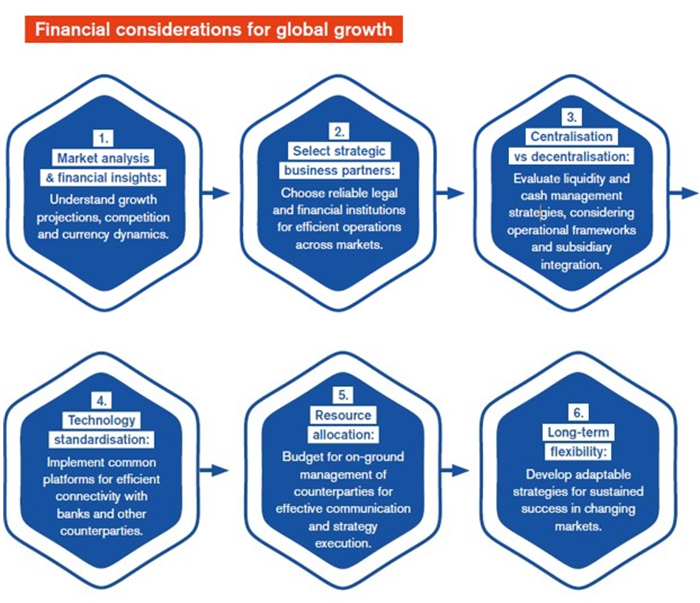Global growth strategies: Navigating international expansion

*This content was produced by Global Trade Review on behalf of Citi Commercial Bank.
Unlocking new international markets is a critical step for mid-sized companies, yet it is full of complexities, from grasping financial market and product intricacies to navigating geopolitical uncertainties. Working closely with the right bank can help navigate these challenges.
Global expansion is a growth strategy for businesses, giving them the potential to tap into new markets, expand their customer base and boost revenue. However, it is an arena often dominated by large corporates. Mid-sized companies venturing into this competitive landscape may find themselves either aiding the growth of bigger companies through supply or directly challenging them, which can be daunting.
The fear of the unknown looms large, as companies grapple with unfamiliar counterparties and the need for risk management across various fronts.
From a financial standpoint, entering new markets involves understanding their nuances, including being aware of the range of financial products available in different regions and exploring structural complexities and associated set-up costs. It requires substantial resource allocation to assess how these market intricacies may impact financial performance.
Similarly, understanding legal frameworks is essential, as they influence the structure and definition of financial products across different regions. This becomes particularly evident when expanding a business beyond major Western hubs.
Heightened geopolitical tensions pose an added challenge for companies growing internationally. Recognizing their impact on expansion strategies, companies may adopt measures such as nearshoring to address potential supply chain risks and reduce dependency on single partners.
Empowering companies with trade finance
As companies seek new trading partners, diversify their supply chains and prioritize security and resilience, trade finance solutions can address the challenges they encounter, with banks playing a critical role.
One key aspect is risk mitigation, where banks can provide instruments to help their clients manage legal, counterparty and credit risks. These instruments include letters of credit and bank guarantees, which can boost assurance and security in international transactions.
Efficient working capital management is also vital for businesses in new markets. Banks can help companies optimize their working capital through both on-balance sheet and off-balance sheet solutions. On the balance sheet, trade loans can offer a cost-effective means of financing short-term working capital needs, leveraging the bank’s capital efficiency. Off-balance sheet solutions, such as supply chain finance and receivables discounting, can address the gap between payments to suppliers and funds from buyers, ensuring smoother cash flow management.
Banks’ trade finance experience can also include funding capital expenditures for international expansion. Instead of relying solely on the bond market, companies can explore options such as export agency finance. Working with an export credit agency allows businesses to secure guarantees that can reduce funding costs, enhancing the financial viability of their expansion strategy.
A distinct offering in commercial banking
With years of experience, trade finance capabilities in over 90 countries and connections with correspondent banks and export credit agencies around the world, Citi is well positioned to help companies expand internationally.
“With Citi, you get local support from teams on the ground and a single bank you can grow with as you enter new markets,” says Shrey Daga, global head of commercial bank sales for trade and working capital solutions.
“We are adept at addressing the nuanced needs of mid-sized companies, giving them the right solutions at the right time, and offering them the same products, platforms and services that we offer to the world’s biggest companies,” Daga adds.
“We open our global network to our clients and recognizing their need for agility and speed as smaller entities, we aim to streamline processes. Our main objective is to enhance simplicity and efficiency for our clients, helping them to navigate the complexities of international expansion with confidence.”
Case study: Vinmar Group
Texas-based Vinmar, one of the world’s largest global marketing and distribution companies in petrochemical products (plastics and chemicals), turned to Citi for support in solving particular challenges in its business.
Vinmar’s objectives were clear: to broaden its reach, mitigate country and buyer risk, and accommodate client requests for extended sales terms.
Vinmar has been working with Citi for many years. Citi provides confirmation of Vinmar’s export letters of credit (LCs) to mitigate the LC issuing banks’ financial risk as well as the local country political and currency risk in those markets. This service is available to support Vinmar’s clients in seven countries in Africa, the Middle East and Asia.
Recently, Citi supported Vinmar with an accounts receivable (AR) finance solution in the US. The solution facilitates the purchase of receivables from US and foreign buyers with extended payment terms in multiple currencies, backed by an insurance policy that mitigates buyer and country insolvency risk. The facility covers buyers in the US and 18 countries across Asia, Europe and Latin America.
Today, Citi is in the process of implementing an AR finance program for a subsidiary of Vinmar in Asia, which will be backed by a Vinmar-owned insurance policy, covering the purchase of receivables in non-US dollars and US dollars.
Through these initiatives, Citi is showing its commitment to optimizing Vinmar’s global presence.


